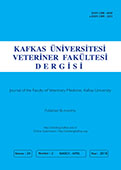
This journal is licensed under a Creative Commons Attribution-NonCommercial 4.0 International License
Kafkas Üniversitesi Veteriner Fakültesi Dergisi
2018 , Vol 24 , Issue 3
Mechanical and Microbiological Properties of Natural Casings Using in Meat Products
1Food Engineering Department, Faculty of Engineering, Afyon Kocatepe University, TR-03200 Afyonkarahisar - TURKEY2Food Engineering Department, Graduate School of Natural and Applied Science, Afyon Kocatepe University, TR-03200 Afyonkarahisar - TURKEY
3Food Engineering Department, Faculty of Engineering, Afyon Kocatepe University, TR-03200 Afyonkarahisar - TURKEY
4Ahmet Ipek Meat Company, Organized Industrial Site, Street 1, TR-03200 Afyonkarahisar - TURKEY DOI : 10.9775/kvfd.2017.18885 The aim of this study is to investigate microbiological and mechanical specifications of the 21 natural casings were provided from various retail markets, slaughter houses and meat processing plants in Turkey that is ready to process. The ash content of the casings were varied between 0.61-3.07% (P<0.05). Water vapor permeability (WVP) of the casings was determined between 1.02-4.37 mg/cm2h (P<0.05). Elongation and tensile strength of the casings were determined between 2.5-18.21% and 5.88-44.08 N/mm2 respectively (P<0.05). The most stable sample expressed as breaking force was reported as Casing7 with 39N while the weakest samples were defined as Casing11 and Casing19 (P<0.05). Contamination with Escherichia coli was determined in nine samples. 16 samples were contaminated with coagulase positive Staphylococci where Casing1 and Casing14 had the highest contamination values as 5.77 log cfu/g and 5.81 log cfu/g respectively (P<0.05). Casing14 had the highest total aerobic mesophilic bacteria recorded as 6.49 log cfu/g while Casing6 and Casing1 were recorded as 6.32 log cfu/g and 6.34 log cfu/g respectively (P<0.05). Salmonella spp. was detected on Casing13 and Casing19. Keywords : Natural casing, Water vapor permeability, Mechanical properties, Tensile strength, Elongation break, Microbiological safety










